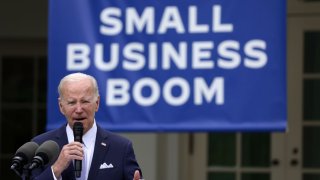
- Small business owners are more optimistic about their operations and the overall economy at the start of 2024, according to a survey by Goldman Sachs 10,000 Small Business Voices.
- The survey adds to a recent string of data showing consumers and businesses have started to grow more confident about the economy.
- Small business owners are still worried about inflation and their ability to access capital.
Small business owners are more optimistic to start the year, even as they face persistent inflation and lending concerns, a new poll released Thursday found.
Seventy-five percent of small business owners are optimistic about their financial trajectory in 2024, up from 68% a year earlier, according to a survey by Goldman Sachs 10,000 Small Business Voices, a policy advocate for small business owners.
Meanwhile, 28% of respondents rated the economy as good or excellent, up 9% from a quarter ago.
We've got the news you need to know to start your day. Sign up for the First & 4Most morning newsletter — delivered to your inbox daily. >Sign up here.
More than half of small business owners surveyed said they expect to create jobs this year, and 62% reported they anticipate profits will increase.
The survey adds to a recent string of data showing consumers and businesses have started to grow more confident about the economy after a stretch where inflation was stubborn and borrowing became tougher.
"The fact that 75% of small business owners are optimistic is a remarkably high number, considering inflation continues to plague them, they continue to face access to capital challenges and workforce-related issues ... all of those challenges have been very sticky for the last few years with no real progress," Joe Wall, managing director of government affairs at Goldman Sachs, told CNBC.
Money Report
The survey was conducted nationally in mid-January among more than 1,400 small business owners.
'Growth opportunities' despite challenges
Jill Bommarito, CEO of Detroit-based Ethel's Baking Company, said she has seen solid consumer spending, and noted that supply-chain issues and inflation are easing. The wholesale baking company, which launched in 2011 and now has 26 employees, specializes in dessert bars and sells in Whole Foods, Target and Costco.
"There's growth opportunities. It doesn't mean we're not up against headwinds ... there's no question about that. However, the demand for real, authentic brands and services is there, and more so than ever," said Bommarito, a graduate of the Goldman Sachs 10,000 Small Businesses program, which provides business education and support services.
The survey also asked respondents to rank the difficulty of the last four years. Interestingly, small business owners found 2023 nearly as hard as 2020 — the peak of the pandemic and a time when many companies could not operate. Thirty-five percent of respondents said 2020 was their most challenging year, while 33% picked 2023.
"I don't think most people appreciate the fact that last year was, for a third of small businesses, they would say that was the toughest year they've had," Wall said, citing the inflation and supply-chain issues owners faced.
Inflation is still a major concern for business owners, even as the rate of price increases falls. Seventy-one percent of those surveyed reported inflationary pressures had increased over the last three months.
Rising prices jumped to the top of the list of small business concerns in the National Federation of Independent Business' monthly read on sentiment in December, outpacing labor woes and regulations.
Some of the economic optimism in Goldman's data could be due to expected rate cuts from the Federal Reserve in the year to come, Wall said. On Wednesday, the Fed left interest rates unchanged and signaled it would not start trimming rates yet.
Main Street is also focused on the lending environment amid high interest rates. About three-fourths, or 77%, of respondents to Goldman's survey said they are concerned about their ability to access capital.
The poll also asked about Basel III Endgame plans, which will increase capital holding requirements for larger and regional banks. The survey found that 86% of respondents said their growth forecast would take a hit if it continues to get harder to access capital.
Goldman Sachs has come out against the Basel III Endgame proposal.
In addition, just about one-third of owners polled said they believe they can afford to take out a loan. Of the 35% of those surveyed who applied for a loan in the last year, nearly 80% found it difficult to access affordable capital. And 40% received all of the funding they requested.
In addition, 28% of respondents who applied for loans said they'd taken out a loan or line of credit with payment terms they found to be predatory.
The NFIB's recent polling also found business owners were paying high interest rates, as the average rate paid on short-term loans hit 9.8% in December, up from 7.6% in January 2023.
Bommarito said access to working capital is her top issue for 2024.
"We're the foundation of this economy," she said of small businesses like hers. "In general, we are just considered the riskier bet."
Don't miss these stories from CNBC PRO:
- Forget the 'Magnificent 7,' these Nasdaq stocks are next in line to lead the rally, according to the charts
- Nvidia is now 'deeply overbought' and due for 'consolidation,' says chart analyst
- Eli Lilly's Zepbound is off to a strong start, but here's what needs to happen to push shares higher
- Investors are shifting into this type of bond fund at the fastest pace in three years






